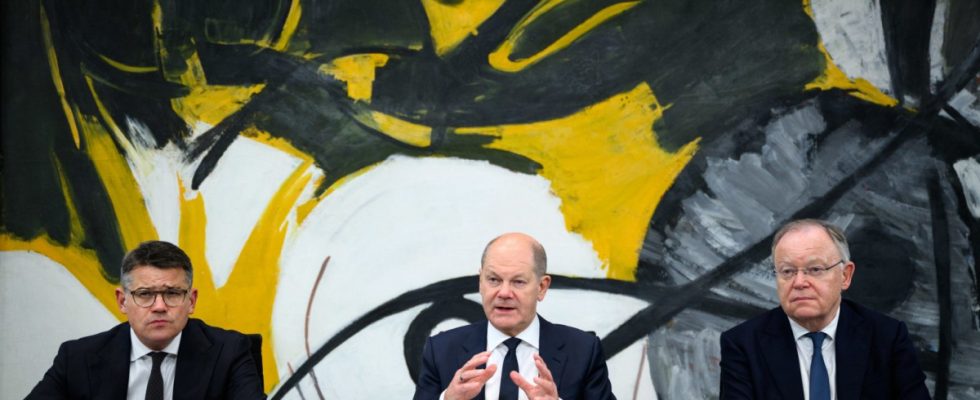“I don’t want to use too many words,” said the Chancellor and then did so: “I believe that this is a very historic moment that we find ourselves in.” After the end of the federal-state summit in the Chancellery, Olaf Scholz, surrounded by the Prime Ministers of Hesse and Lower Saxony, alluded to the fact that, in the face of major challenges, “all levels of this state work closely together.” The citizens expected this and now they have proof that this alliance against major problems actually works. “Good news early in the morning,” said the visibly sleepy but also relieved Chancellor before dawn on Tuesday.
With these words, Scholz was not only about praising successful government actions in general, but of course also the actions of Olaf Scholz in particular. Because Scholz sees himself as the father of the idea of facing the difficult times with a non-partisan coalition. In September he offered a “Germany pact” in the Bundestag. That was at the end of a summer break during which there was much discussion about the possible decline of the industrial nation Germany. At that time, Scholz tried to regain control by suggesting an alliance between the federal government, the states and the opposition. At the federal-state summit earlier this week, two compromise packages were put together, one on reducing bureaucracy and one on migration. Whether and how they work is unclear; The debate about what else might be necessary has already begun.
The situation is clearest when it comes to so-called planning acceleration. It is the core of what Scholz is striving for with the Germany Pact – he said in the Bundestag: “Only together will we shake off the mildew of bureaucratism, risk aversion and despondency.” At the time of this speech, however, the federal and state governments had already been exchanging suggestions for months to simplify bureaucratic processes.
Now both sides have actually agreed on reforms, which should, for example, lead to the faster construction of wind turbines, power lines or apartments. A hundred measures have been agreed, said Scholz on Tuesday. Hesse’s Prime Minister Boris Rhein called the measures “granular”, but they would “have a real impact”. What’s new is actually in the granular level: unlike before, when the federal and state governments always blamed each other for the standstill, this time experts from both sides looked at the most detailed laws and regulations and tried to sort out what was slowing things down without achieving anything. A success, although CDU leader Friedrich Merz noted that the praise belonged more to the states than to the Chancellor.
Asylum procedures in third countries? Scholz thinks little of it
Things get politically more complicated when it comes to migration – or rather the non-partisan attempt to contain it. The decision by the federal and state governments includes many things that the federal government has already initiated: the reform of EU asylum law, controls at Germany’s external borders, stricter rules for deportations. Furthermore, the federal and state governments want to reduce financial incentives by not providing refugees with cash, but only with a payment card. Asylum seekers can no longer transfer money back home.
But the dispute doesn’t end there. At the federal-state summit, the Union states pushed through the demand to consider asylum procedures in third countries in order to remove a number of asylum seekers from the EU. Scholz has promised to have this examined by experts – but he doesn’t hide the fact that he doesn’t think much of the idea because hardly any country is likely to be interested in taking asylum seekers away from the EU. As soon as the federal-state summit was over, CDU leader Merz canceled his party’s planned cooperation with the federal government on the issue of migration. The Chancellor is not prepared to substantially continue the conversation with the CDU/CSU parliamentary group. “This means that the issue of the German pact on migration is settled,” said Merz. His Secretary General Carsten Linnemann had previously said that the measures adopted were far from enough to curb irregular migration.
It was particularly important to Scholz that there was no sign of discord or disunity from the federal-state meeting. From his point of view, the federal government, the states and the democratic parties have to prove right now that they are capable of taking action. But there is also a risk in this: If the number of refugees does not fall in the coming year, many citizens are likely to be of the opinion that “the established parties” or “politics” cannot do it. And that could above all strengthen the party that always claims exactly that – the AfD.

